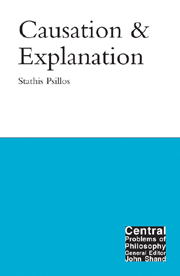5 - The regularity view of laws
from II - Laws of nature
Summary
From causation to laws
The Humean RVC ties causation as it is in the world to the presence of regularities in nature: to call a sequence of events c and e causal is to say that this sequence instantiates a regularity, namely an invariable succession between event-types C and E. We have already seen, though, that not all regularities establish causal connections. There can be mere correlations of event-types (e.g. the night invariably following the day) that are not causal. So the advocate of RVC, namely, a Humean about causation, should be able to say a bit more about what distinguishes between good regularities – ones that can be deemed causal – and bad ones – ones that are, as Mill put it, “conjunctions in some sort accidental” (1911: 222). One prominent thought has been that the good regularities capture laws of nature, while the bad do not. Let us follow customary philosophical terminology and call accidentally true generalizations (or accidents for short) those generalizations that are true, but do not express laws of nature. In light of this, RVC should be seen as asserting the following two things:
(a) causation is a species of regularity.
(b) the species of regularities that causation reduces to are laws of nature.
Let us, now, call the Regularity View of Laws (RVL) the view that:
(c) laws of nature are regularities.
- Type
- Chapter
- Information
- Causation and Explanation , pp. 137 - 158Publisher: Acumen PublishingPrint publication year: 2002

